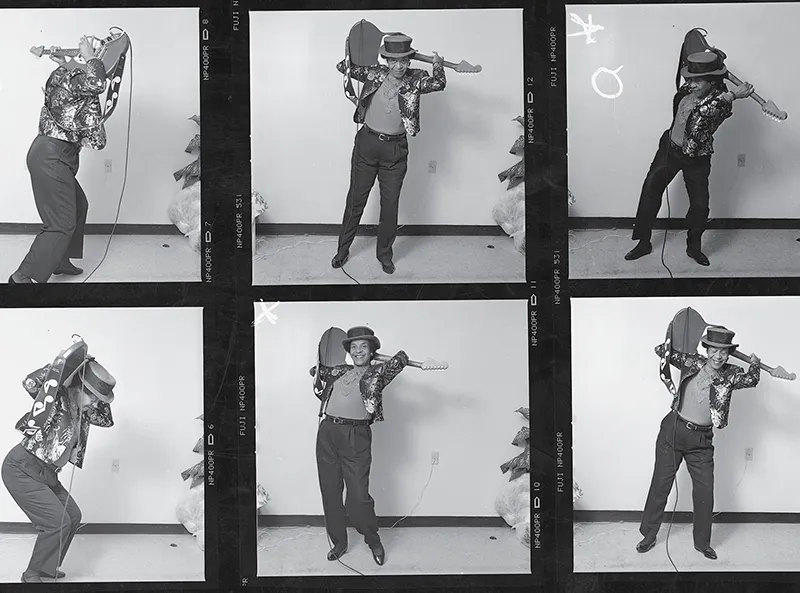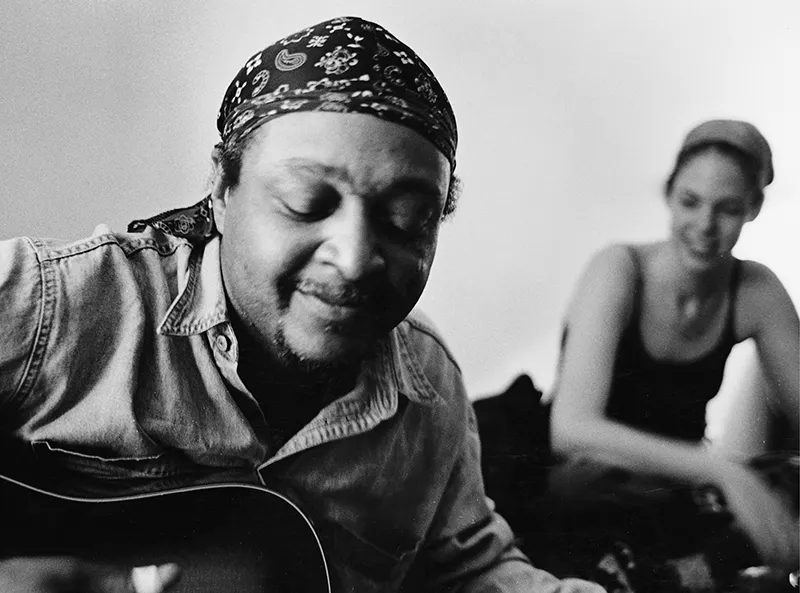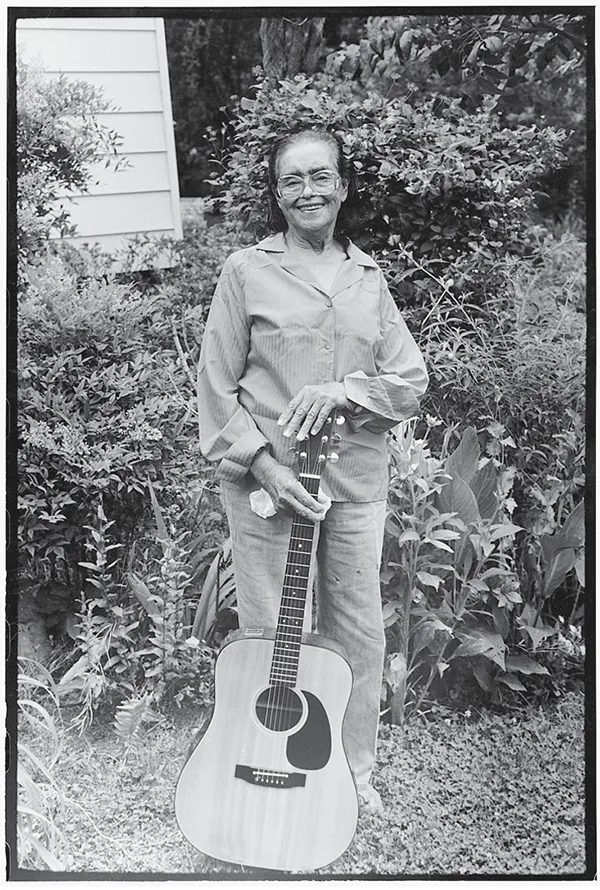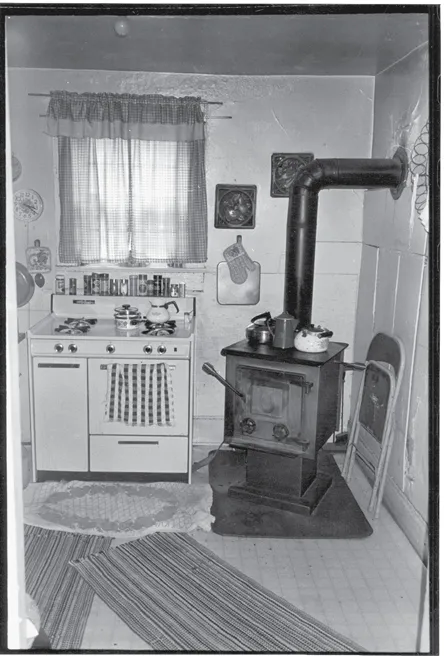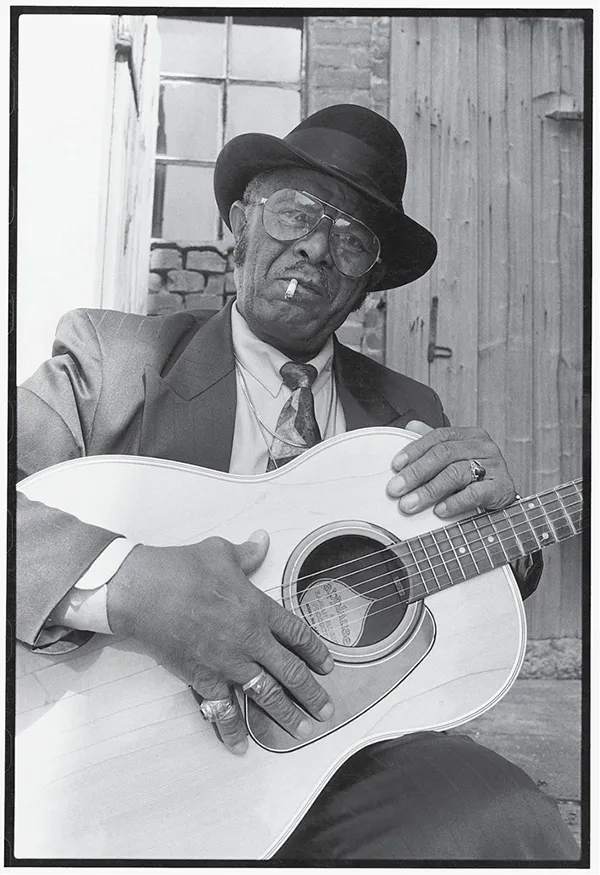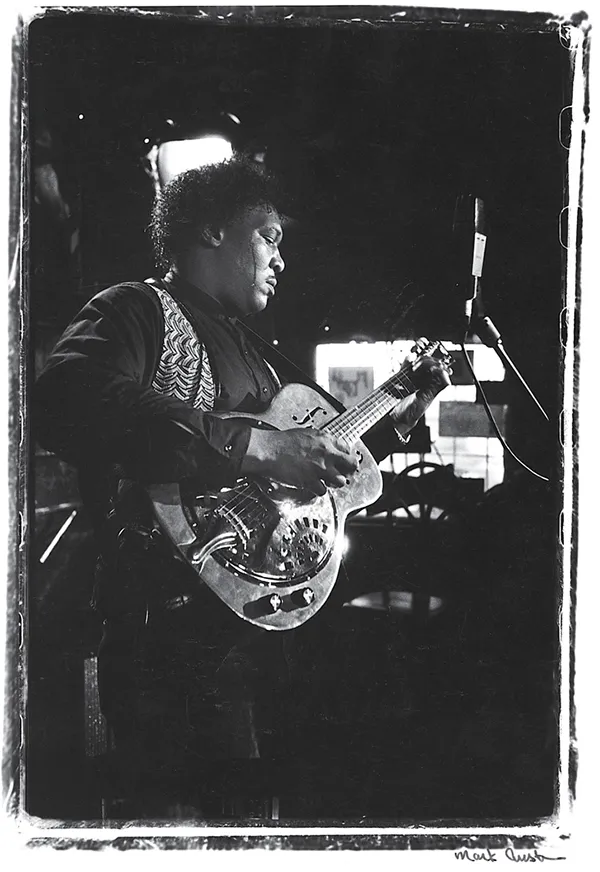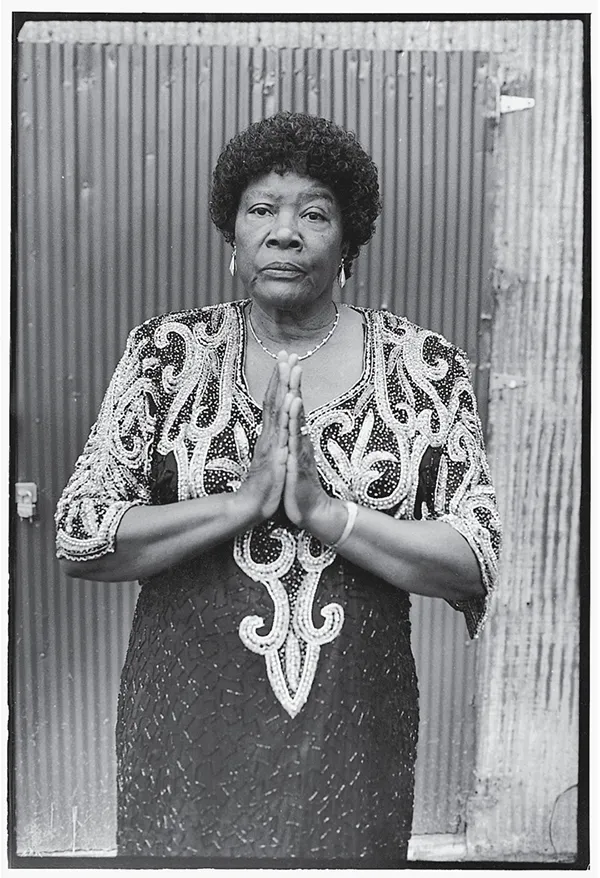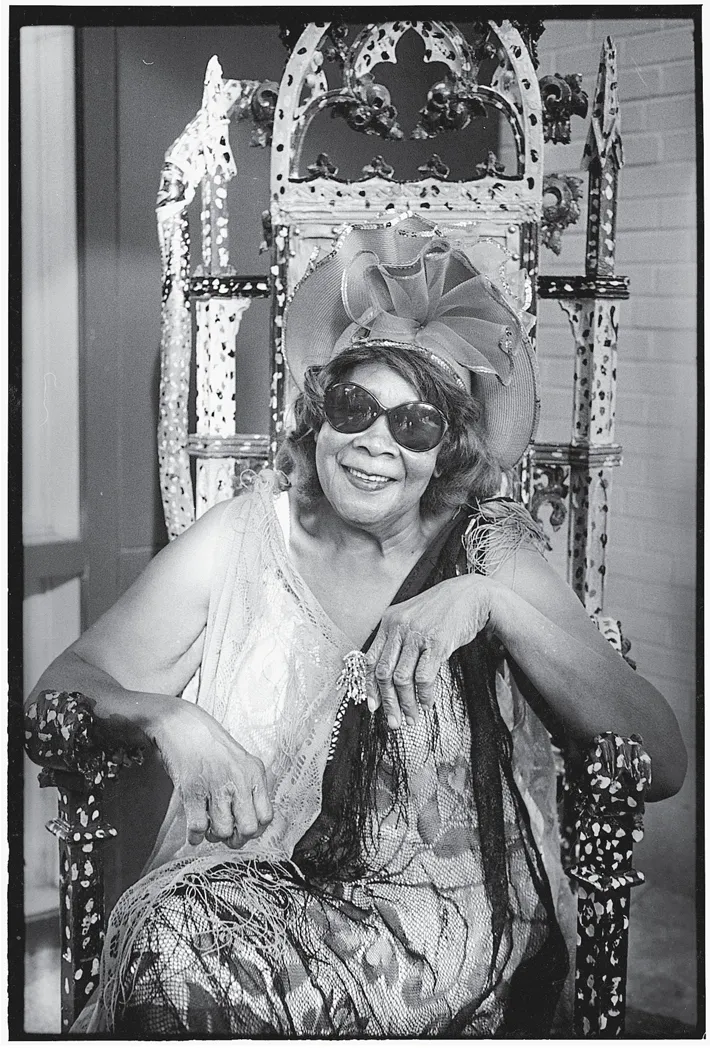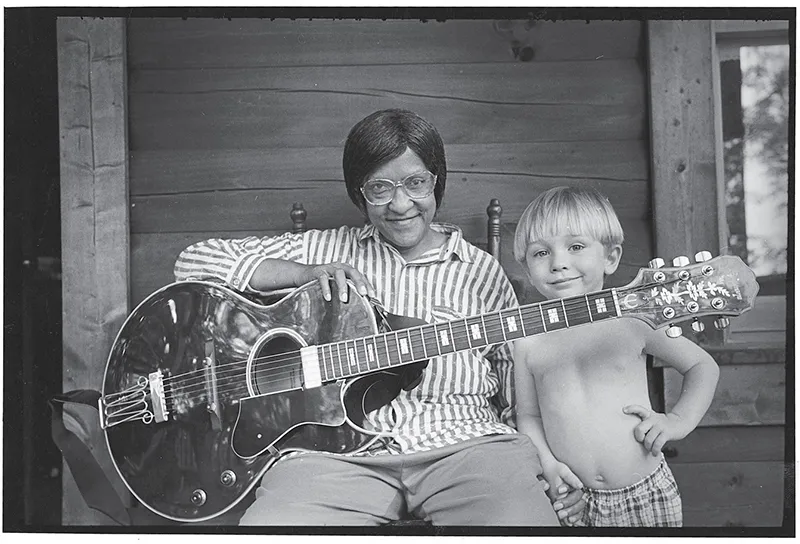![]()
THE ARTISTS
Beverly “Guitar” Watkins, Atlanta, 1999. Duffy
Chicago, 1999 Duffy
Little Pink Anderson
Born in 1954, LITTLE PINK ANDERSON of Spartanburg, South Carolina, began singing at medicine shows and carnivals with his legendary father Pink Anderson at the age of three. He still performs the highly entertaining old folk songs that his dad made famous, such as “Travelin’ Man” and “Cook Good Salad.”
HIS DADDY AUTOGRAPHED THE SIDEWALK, christening the wet cement at 583 Carpenter Street, and no one in Spartanburg gave a damn. His daddy died in poverty, unaware that he’d inspired luminaries such as Johnny Cash or that a British art rock band had combined his first name with that of another obscure bluesman (Floyd Council) and made it their own. His daddy sold bootleg whiskey, and he got a pretty penny for the hooch come Sundays. His daddy lay dead in the cemetery ground without a marker until some Yankee devotees named Roy Bookbinder (these days, it’s Roy Book Binder) and Paul Geremia anted up about sixty dollars for a small piece of stone that reads PINK ANDERSON—RECORDING ARTIST.
Now here’s the son, and he’s singing his daddy’s songs, in his daddy’s medicine show style—vaudeville-meets-Hicksville ditties about greasy turnip greens and the god-forsaken Nasty Branch and West Henry Street and how you need five women, ’cause two might quit you and the other three might die.
Ever since that big crap game, I’ve been living off chicken and wine.
Little Pink comes by this stuff honestly. His daddy taught him about guns and about money, and the lessons were readily learned. But he also taught him about the power of laughter and the glory and grace of song. He taught him how to play a guitar, and the first lesson learned was “St. James Infirmary.” He taught Little Pink a version of “In the Jailhouse Now” that references Spartanburg’s Broad Street jail, where Little Pink would later serve time.
“I used to think that the guitar was just good to get a few extra dollars and a woman,” Little Pink says. “[Daddy] told me, ‘One day, you gonna pick up that guitar and you gonna take it serious. That guitar will feed you when nothing else will.’”
So now Pink is a hero of the American roots music scene and Little Pink is a free and affable man, bent on preserving his daddy’s legacy and on securing a page of his own in the grand story book of the blues. He has it to do over again.
His work is both subtle and mighty. It’s beautiful and funny and heartbreaking and chilling. It’s virtuosic and elemental. It’s a piece of Pink that no one but the son could replicate, and it’s a testament to Little Pink’s own individual gifts. He’s a bad ass, no matter where he came from, and if he ever puts his index finger into wet cement and scribbles Little Pink Anderson, everybody damn well better pay attention.
—PETER COOPER
In her garden, Morganton, North Carolina, 1996 Duffy
Etta Baker
ETTA BAKER of Morganton, North Carolina, was born in 1913 and has been playing guitar since the age of four. She is the premier woman Piedmont blues guitarist. Her only contemporary was the late Elizabeth Cotton of Carrboro, North Carolina. Etta maintains a beautiful garden—an Eden of flowers, herbs, shrubs, healing plants, and fruit trees. She works in her yard every morning, coming inside only for lunch. Etta is constantly working on new arrangements as she plays the guitar every day.
“Because she was a stunning beauty, Etta’s husband refused to let her travel and perform away from home. She never stopped playing the music! This gracious grandmother was the source of a great deal of joy and surprise when I found that she still played guitar after I had heard her early recordings in the sixties. One of the signature chords of my guitar vocabulary comes from her version of ‘Railroad Bill.’ This was the first guitar-picking style that I ever learned.”
—TAJ MAHAL
Etta Baker’s kitchen, Morganton, North Carolina, 1998 Duffy
Elvershausen, Germany, 1995 Küstner
Robert “Wolfman” Belfour
Axel Küstner and I were returning home from a long fruitless trip to Greasy Corner, Arkansas, to locate and record “The Flying Black Eagle,” a little-known harp player who we later found out died only a few weeks after our attempts to find him, and we drove through Memphis. Axel lead me to ROBERT “WOLFMAN” BELFOUR’s door. On a hot summer day this man performed in the rare guitar style of the North Mississippi hills. He told us that he had been born in 1940 in Holly Springs, Mississippi, and back there in the country at a house party, he might play just one song for two hours at a time as the people danced.
I could never get away from the guitar. It was something that I could do, and then I could lay it down, set it back in the corner, and I had to go back and get it. Something always would bug me to play. I’d go to sleep with it in my lap.
With National guitar, 1997 Austin
Sammy Blue
SAMMY BLUE first heard the blues as a young child at family picnics where blues legend Buddy Moss often performed. Sammy lives outside Atlanta and has created his own unique blend of urban and country blues.
“Sammy Blue of Atlanta is one of the best-kept secrets in roots music. I have been watching him develop over the last thirty years. He has an awesome delivery and presence. What is really very exciting is his writing and arranging style and the instruments that he brings together. It will keep you listening and coming back for more.”
—TAJ MAHAL
Pinnacle, North Carolina, 1999 Duffy
Essie Mae Brooks
ESSIE MAE BROOKS was born in Houston County, Georgia, in 1930. Her father was a great drummer in the nearly forgotten African-American tradition called drumbeat. He would play the drum every weekend and people would gather and dance all night long. Her grandfather was a harmonica player and Essie started singing to accompany him. She began singing and writing gospel songs as a girl and has never stopped.
“Rain in Your Life”
This old life of mine, I sure had my ups and downs.
I’ve been up and I’ve been down,
I’ve been pushed and shoved around,
I’ve been picked at and picked on, but that’s alright.
You got to have rain in your life to appreciate the sunshine.
When I lost my mother, you know it was sure enough rain,
When I lost my father, you know it was sure enough rain,
When I lost my sister, you know that was more rain.
You got to have rain in your life to appreciate the sunshine.
Lord, when trouble get all around.
That ain’t nothing but rain.
When trouble get all in the way, that is nothing but rain.
When trouble get all in the home, that is nothing but more rain.
You got to have rain in your life to appreciate the sunshine.
If you never had no rain in your life, then you don’t know what I’m singing about.
You got to have rain in your life to appreciate the sunshine.
Charlotte, North Carolina, 1998 Duffy
Cora Mae Bryant
CORA MAE BRYANT is the daughter of Georgia guitar legend Curley Weaver. Curley would perform from one house party to the next, often meeting up with his friends Blind Willie McTell and Buddy Moss. Cora Mae was there, taking it all in, singing along, sitting on the knees of the men that created this music.
“When we was out partying, they loved to hear all Curley’s songs but two they especially loved was ‘Ticket Agent’ and ‘Tricks Ain’t Working No More,’” Cora Mae says. “You could really hear their feet stomping. Daddy and I used to sing ‘Wee-Wee Hours’ together, it was really pretty.”
Cora Mae Bryant is a blues scholar and her house in Oxford, Georgia, is a veritable blues museum. She can tell you everything you need to know of the old blues.
from “McTell, Moss, and Weaver”
McTell, Moss, and Weaver, they was real good friends,
They stuck to one another until the end.
They gone and left me behind, sometimes I feel like crying.
I miss McTell, I miss you Moss, and I miss you Curley Weaver, from being around here.
With Lucas Duffy, Warm Springs, Georgia, 1999 Duffy
Precious Bryant
PRECIOUS BRYANT has a sparkle of light that shines deep into the heavens when she sings and plays her guitar. She was born in rural Talbot County, Georgia, in 194...

